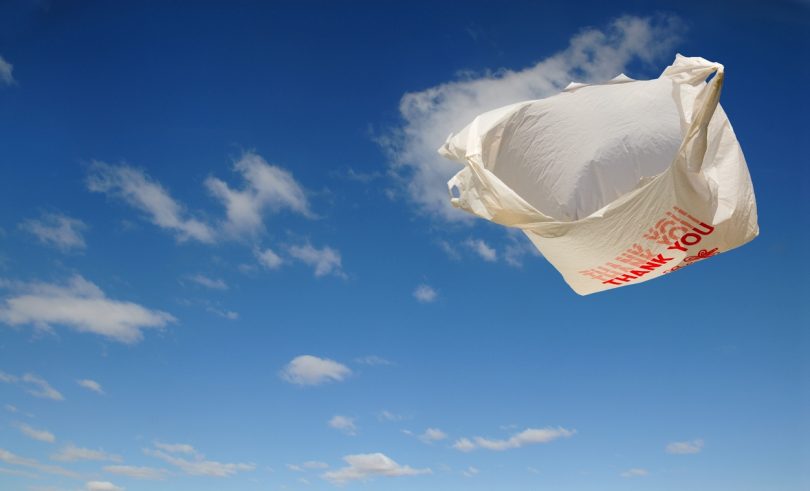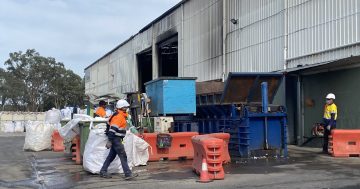
More needs to be done or the ACT will be back where it was before the single-use plastic bag ban.
Canberra shoppers may soon be paying at all retail checkouts for all their plastic bags if the key recommendation is adopted from an independent review of the ACT’s single-use plastic bag ban.
The independent review by Commissioner for Sustainability and the Environment, Professor Kate Auty, tabled in the Legislative Assembly on Thursday (20 September), calls for a mandatory minimum price for all plastic shopping bags at all stores, as well as for so-called biodegradable and compostable bags.
Big retailers already charge for their plastic bags but Professor Auty believes a price signal based on bag mass across all outlets for all bags is needed to further reduce consumption.
The review found that the ban had had significant environmental benefits and been embraced by the community but would not be enough to prevent plastic bag consumption returning to and beyond pre-ban levels as the Territory grows.
Professor Auty said it was up to the Government to decide on a price but she envisaged shoppers who did not bring their own bags and wished to use ones provided in-store would pay at the cash register, and it would be a reward for those who had been bringing their own bags to the shops over the years since the single-use ban was introduced in 2011.
“It’s up to the Government what bags would be priced, but we need a plastic bag pricing regime, that’s the way to give an additional nudge to get the better outcomes for the ACT,” she said.
The review found that the ban has had a marked impact on the Territory’s consumption of single-use plastic bags, reducing reduced plastic bag use by over 55 million bags last year alone, and by 60 per cent, or 1131 tonnes, between 2011 and 2018.
But Professor Auty said that unless additional measures were taken the ACT would soon be back where it started by the early 2020s.
Professor Auty said the price signal needed to go hand in hand with a mandatory plastic bag disclosure regime requiring retailers who sell or distribute plastic bags to annually report on bag sales and distribution, bag type, size and mass.
She said at present one could only speculate about the numbers of bags sold and profit made.
“It is absolutely critical to have full disclosure of those things that underpin the economy of the plastic bag,” she said. “We need to be able to say here’s the data, here’s the amount that’s been made by selling bags.”
The other recommendations call for improved and streamlined governance arrangements within ACT Government agencies and further research into biodegradable and compostable plastics and particularly their potential in conjunction with the proposed household organic collection scheme.
But Professor Auty said plastic bags were only part of the overall problem and the review had also examined what was happening overseas when it came to waste, particularly in Europe, and extolled the merits of the circular economy where waste is kept out of landfill and recycled, repurposed or converted.
“We need to stop the waste wherever we can and the circular economy is the way to go about it,” he said.
Minister for Climate Change and Sustainability Shane Rattenbury said the review would be handed to Minister for City Services Chris Steel who would deliver the Government’s response but he said the price recommendation was a strong one and the ACT needed to ensure that it had concrete strategies in place.
“This report sends a very clear message that we must take further steps or the plastic will build up and we’ll find ourselves back where we were when we started this,” he said.
The review found strong community support for the plastic bag ban, with 68 per cent of survey respondents backing the ban and 64 per cent supporting further reduction measures and 69 per cent saying they believe the ban has had a positive impact on the environment.
More than half (57 per cent) said they had reduced their plastic bag usage because of the ban, and 68 per cent said they took their reusable bags with them when shopping, always or most of the time.
Mr Rattenbury said the community had a real appetite for reducing plastic waste across the board whether it was plastic bags, straws or ”all those types of things that we use and throw away”.
Both Mr Rattenbury and Professor Auty said industry needed to be involved but Government leadership was needed to bring about change.
“We hope to see change from industry but there’s a role for government to push that change and not wait around for industry to get around to it,” Mr Rattenbury said.
The review also canvassed other options including increasing the minimum thickness of plastic shopping bags, requiring all plastic bags to be biodegradable and compostable, and a complete ban on plastic bags.

















